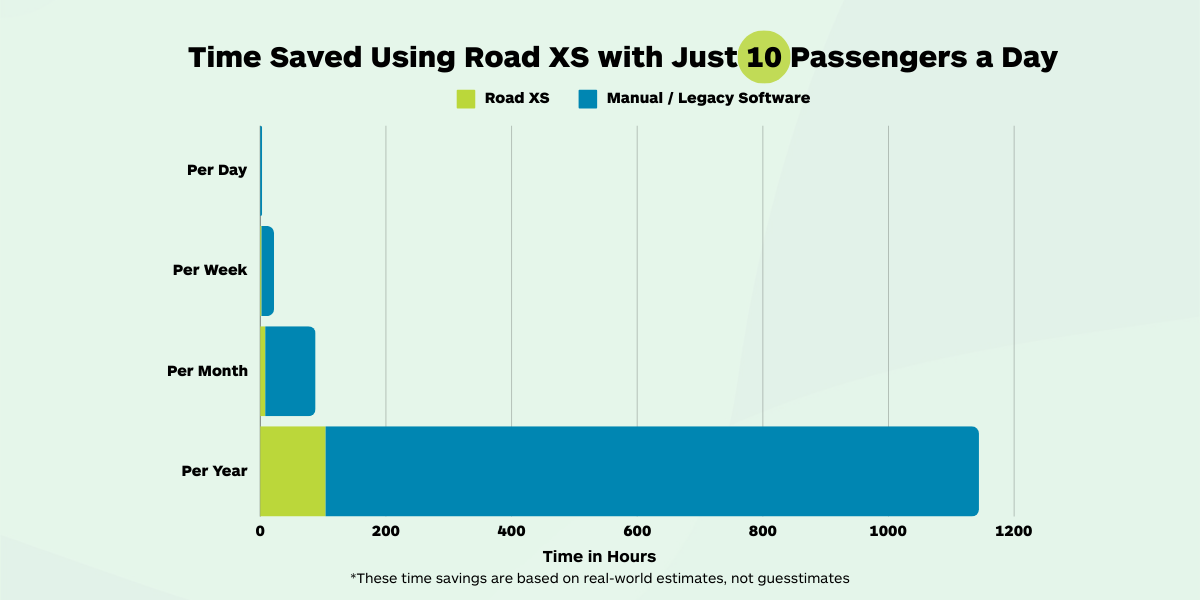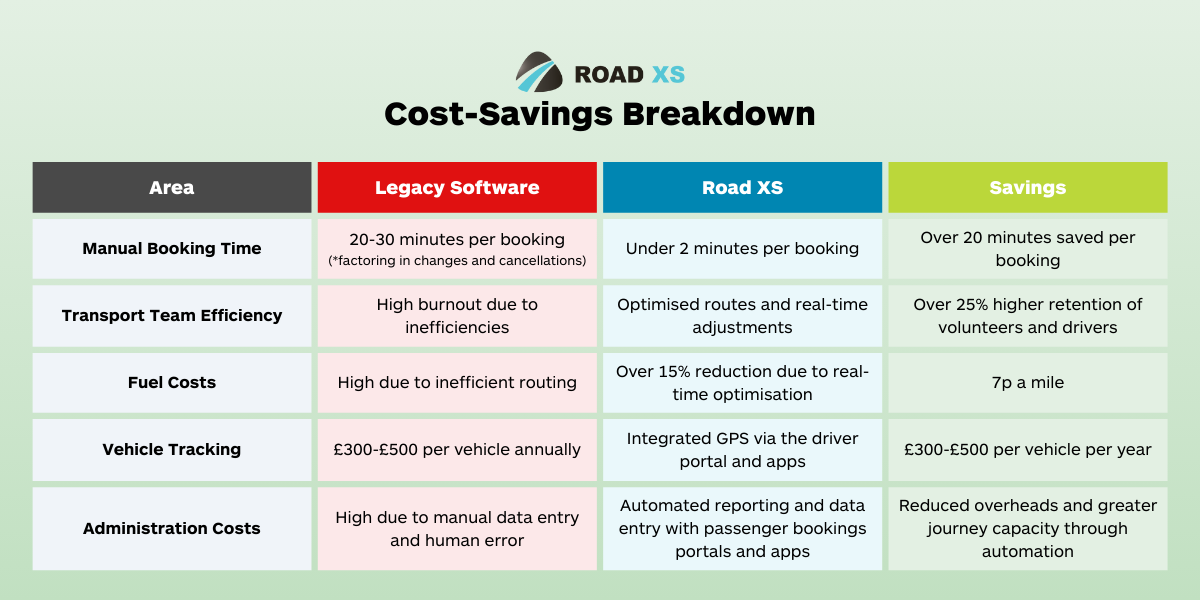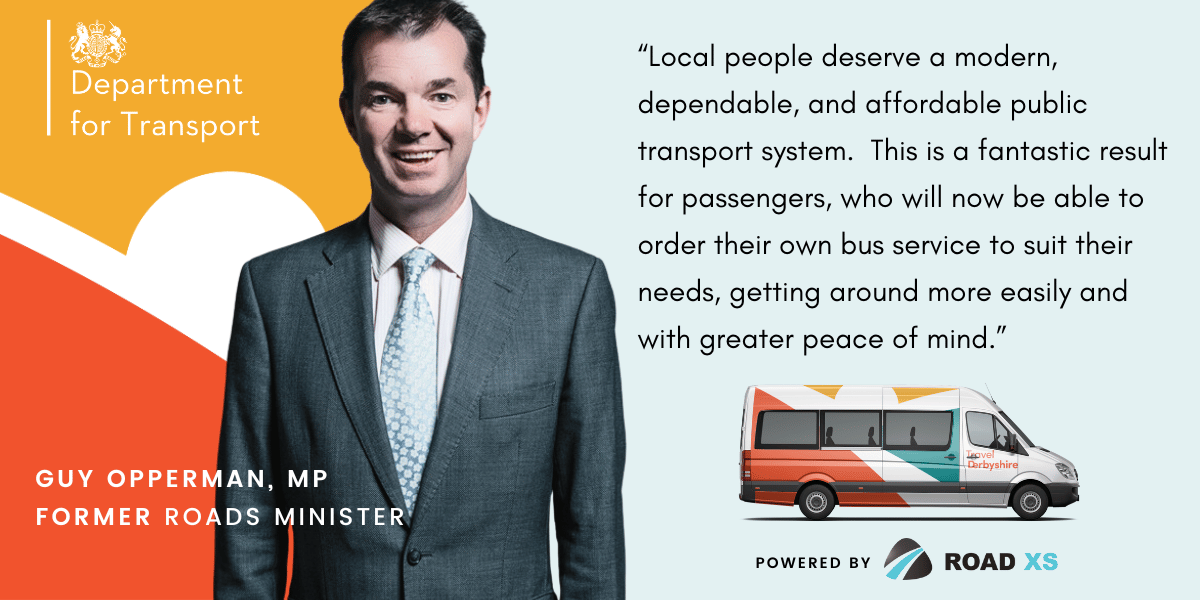The Hidden Costs of Using Legacy Transport Software and Systems
The average transport operator spends at least two full days per week on manual planning, scheduling, and re-routing of journeys. That’s nearly 104 days per year lost to administrative tasks, but the inefficiencies don’t stop there…
Insight:
15% of all missed hospital appointments are due to transport-related issues, costing the NHS over £24 million pounds each year.

Research shows that 20% of journey times are often miscalculated when relying on legacy transport systems, resulting in late arrivals, unnecessary vehicle fuel consumption, and missed opportunities for greater passenger capacity on journeys.
The 2024 Mapping England Report by the Community Transport Association revealed that community transport operators (CTOs) are struggling with issues like volunteer shortages, outdated systems, and complex booking processes. The need for scalable, intelligent transport solutions has never been more urgent.
%
Lost in efficiency
%
Higher admin costs
Hours lost each week
%
Higher fuel costs
New Report
The True Cost of Legacy Transport Software
Outdated transport software is silently inflating costs for transport operators, passengers and even the NHS through excessive overheads and inefficiencies.
Popular
The Road Ahead: 10 Challenges Facing Community Transport
The UK Population is Shifting Rapidly
With an ageing UK population and rising costs, the pressure to deliver efficient, responsive transport services is greater than ever. Yet, many transport operators are stuck using outdated systems, wasting time and resources with manual processes. The result?
Over 40% drop in efficiency.
The UK is seeing a significant shift in demographics. By 2040, one in four people in the UK will be aged 65 or over, and the need for accessible, reliable community transport will only grow.
For many older adults, community transport car schemes and Dial-a-Ride (DRT) services are a lifeline, offering crucial access to healthcare, social events, and day-to-day errands.
The capacity of these services is under strain. Outdated systems simply can’t handle the growing demand, leading to longer wait times and fewer available trips.
Bookings that should be confirmed instantly are taking days, making it impossible to keep up with the surging demand for efficient transport services.
It’s no wonder, that 15% of all missed hospital appointments are due to transport related issues, costing the NHS over £24million pounds each year.
An Ageing Population with Increased Demand for Transport
The UK’s ageing population is growing significantly. As of 2023, one in five people (18%) in the UK are aged 65 and over, and this is expected to increase to one in four by 2039.
Rural and coastal areas are seeing the highest concentrations of older people, with local authorities like North Norfolk and Rother already reporting that over 30% of their populations are 65 and older.
This ageing trend means that transport operators will need to expand their services to meet the growing demand for accessible transport. By 2040, the population of people aged 80 and over is expected to more than double from 3 million to 6.3 million


Transport Inefficiencies Let People and the NHS Down
Traditional transport systems are not keeping pace with these demographic shifts. Reports indicate that the transport network is failing the oldest and most vulnerable, particularly in rural areas where public transport options are scarce, contributing to a decline in accessibility to essential transport services.
Worse, transport operators are taking days to book journeys for elderly passengers due to manual processes, leading to missed medical appointments and increased costs to the NHS. The inefficiencies in these outdated systems not only waste valuable time but also put vulnerable passengers at risk by delaying access to crucial services.
As the ageing population grows, these gaps will only widen unless transport providers adopt modern, automated solutions to ensure efficient and reliable services.
The Economic Impact of Legacy Transport Software
Legacy transport software increases costs and stifles growth by relying heavily on manual processes. Inefficient route planning can lead to up to 15% higher fuel consumption, inflating operational expenses amidst rising fuel prices.
Outdated transport systems result in up to 25% higher administrative costs due to labour-intensive tasks, draining resources that could otherwise fuel service expansion. Operators using legacy systems face significant inefficiencies, with up to a 40% drop in operational capacity, limiting their ability to handle more bookings or scale services effectively.
This results in a greater economic burden and missed opportunities for growth.

Real-World Cost and Time Savings with Road XS Technology
Road XS is designed to eliminate these inefficiencies. With intelligent route planning, real-world timing adjustments, and the ability to handle 100% of booking permutations automatically, Road XS saves operators over two full days per week.
That’s not a claim—it’s a fact.

This results in substantial time savings each year, depending on the number of passengers you handle daily. Here’s how the time savings increase as the number of passengers handled grows per day:
Time Saved Each Year:
Transport Team Booking All Journeys
saved per year handling
10 passengers per day
saved per year handling
25 passengers per day
saved per year handling
50 passengers per day
saved “per year” handling
100 passengers per day
Time Saved Each Year:
60% of Passengers Booking via an App
saved per year handling
10 passengers per day
saved per year handling
25 passengers per day
saved per year handling
50 passengers per day
saved “per year” handling
100 passengers per day
More Than Just Time Savings…
But it’s more than just saving time. Road XS provides a platform for growth without increasing overheads, enabling transport operators to:
Increase Journey Capacity
With pinpoint precision, this reduces fuel consumption by up to 15% as well as increasing journey capacity.
Automate Bookings
Instantly process bookings through a 24/7 online portal for a seamless passenger experience, while also catering to less tech-savvy users via integrated call centers. Opt for full, or semi-autonomous bookings
Cut Operational Costs
By automating crucial tasks with real-world mapping and advanced algorithms, operators can cut operational costs by over 25% and scale services efficiently without the need for additional staff to meet growing demand.
Two Days Saved Per Week
Many Dial-a-Ride and DRT services still rely on manual processes for route planning, bookings, and scheduling changes. On average, operators spend 1-2 hours per day on these tasks (booking just 10 passengers on each day). By automating these processes, Road XS saves 10 hours per week or 520 hours per year.
If a transport administrator is paid £12 per hour, that’s a saving of £6,240 annually per staff member – and that’s if they’re only handling just 10 passengers per day…or frees your volunteers to perform more rewarding tasks with their time.

25% Reduced Admin Costs
Manual tasks like data input, phone calls, and route adjustments bloat administrative overheads. Road XS allows for the automation of these tasks, reducing the workload for staff considerably.
By automating routine tasks, reducing manual errors, and improving staff efficiency, Road XS can save operators over £23,000 annually, allowing them to reallocate resources towards growth and service improvement without increasing headcount.
*Calculated on the basis of two administrators on £12 an hour.

15% Reduction in Fuel Consumption
Inefficient routing wastes fuel. Studies show that optimised routes can cut fuel consumption by 10-15%. For example, a vehicle driving 200 miles per week could save 30 miles per week with optimised routes. Over a year, that’s 1,560 miles, saving £292.50 in fuel per vehicle.
A fleet of 5 vehicles could save £1,462.50 annually. Using precise navigation, Road XS also saves mistakes and wrong turns saving volunteer drivers fuel costs too.

30% Reduction in Errors and Missed Bookings
Manual processes often result in errors that cost time and money. Automating bookings and routing reduces the chances of errors by 30%.
Correcting booking errors could take 65 hours per year, costing £780 in admin time. Reducing errors by 30% saves £234 annually per operator.


Book Your Demo
User-Friendly Transport Software
Road XS stands out as the most user-friendly transport software, offering a scalable platform that sets it apart from competitors. Its intuitive design and flexibility make it the ideal choice for any serious transport operator.
Demand Responsive Transport Services

Community Transport Services

Non-Emergency Patient Transport Services

A New Dawn in Transport Software
Wave goodbye to using paper, spreadsheets and manual calculations and experience a new world of automated transport bookings, modern apps, precise navigation and the ability to scale and grow your transport services with ease.

New Guide
Your Guide to Community Transport Software
This insightful guide offers thoughtful considerations and a comprehensive 25-point checklist, helping you ask the right questions when evaluating community transport software providers.
